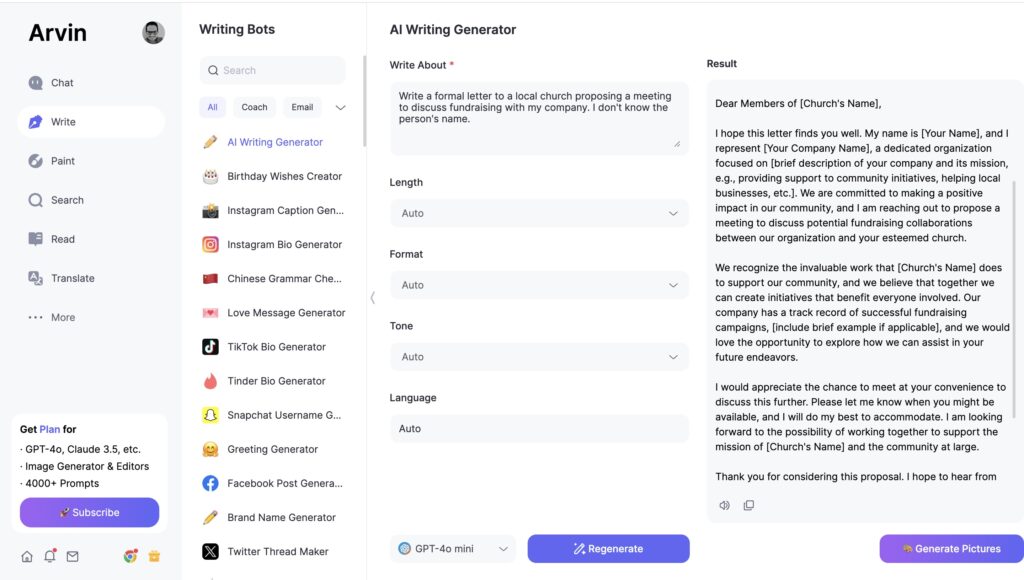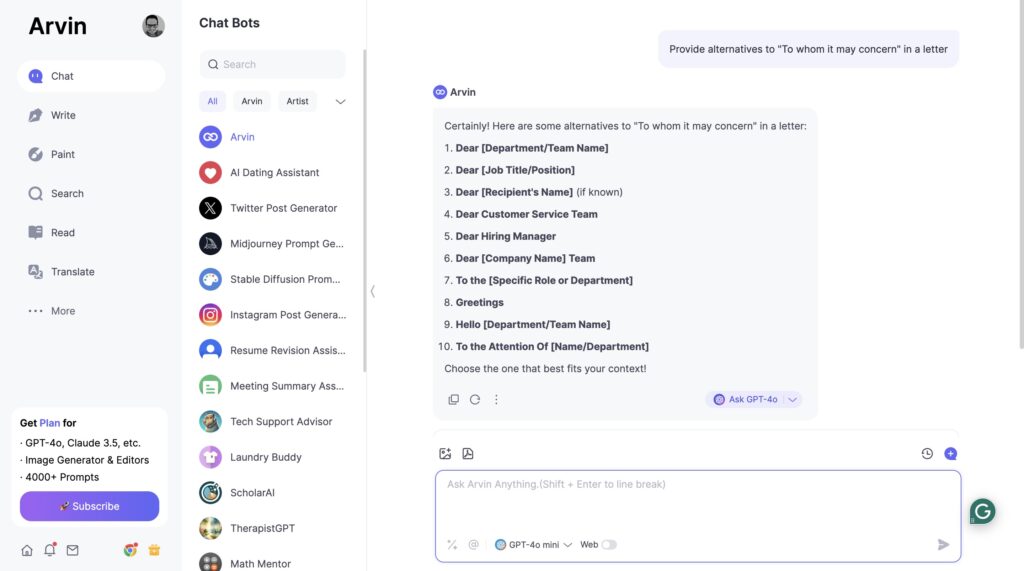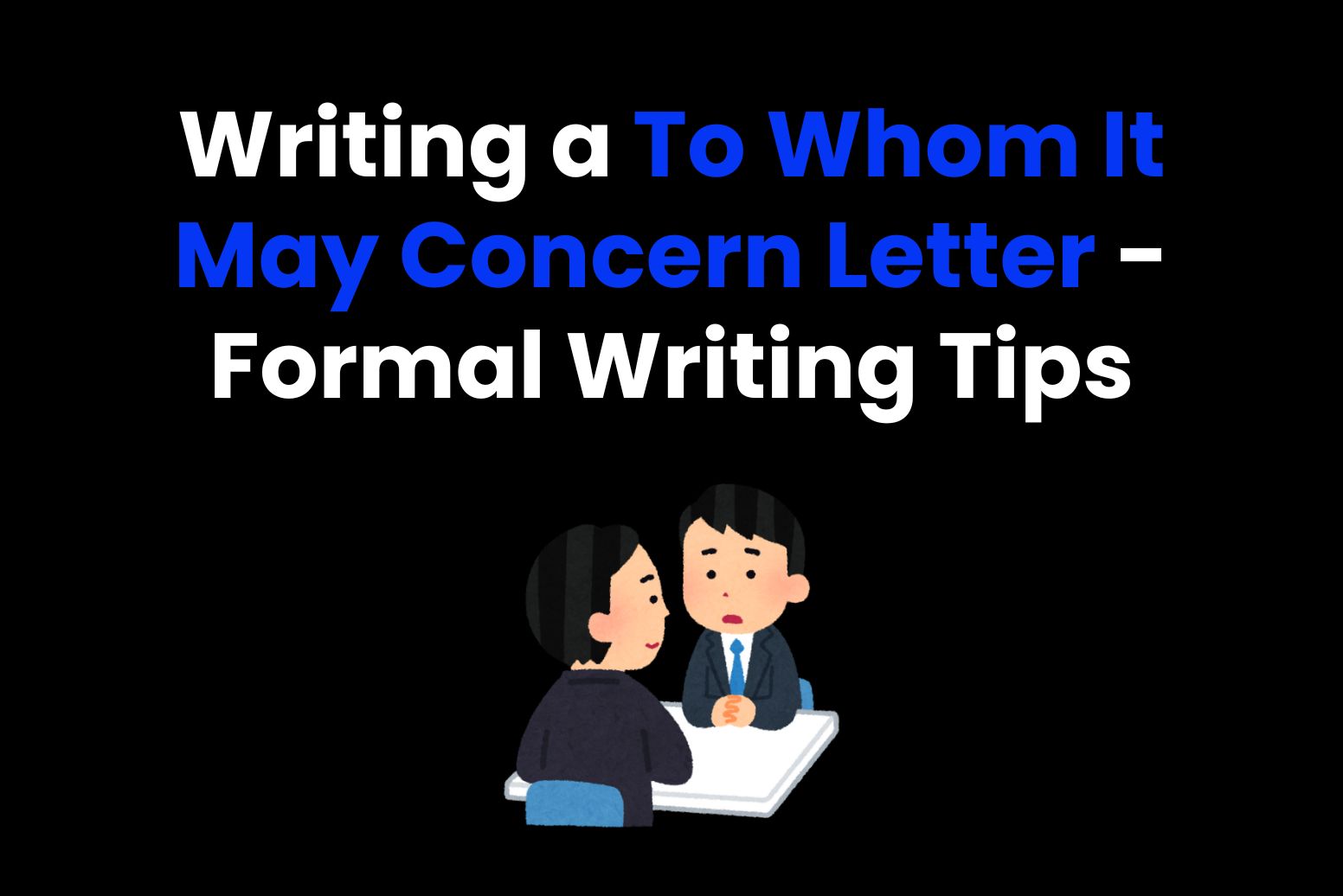Writing a to whom it may concern letter is appropriate from time to time.
For instance, you might need to send a letter to a company to complain about a missing delivery. Alternatively, you might be looking for job opportunities and may use it to contact numerous potential hiring managers.
Though it’s a very formal way to address a letter or an email, to whom it may concern is still a very common greeting to use.
In this article, we explain how to use it correctly. We introduce scenarios in which its use is appropriate and run through some alternatives that you might like to use.
We also show you how Arvin AI can help you to perfect your letter-writing skills, with tips on the best prompts to use.
What is a to whom it may concern letter?

Using to whom it may concern at the top of a letter is useful when you don’t know the name of the person you’re writing to. It can also be used if you don’t want to specify who should open the letter.
After all, you might be writing to a company and have a name at hand, only to be unsure if the named person is the right employee to open and read the letter.
Using “to whom it may concern” puts the ball in the recipient’s court. If you send it to a department, the person who opens the letter can decide who to forward it to.
You can also use it when you intend more than one person to read the letter. You’re essentially inviting anyone who is “concerned” with the topic of the letter to read it. In contrast, if you know who you want to read your letter, you put their name at the top.
However, you need to be a little careful when using it. The biggest issue with this greeting is that it lacks personalization. In some situations, this can be detrimental and may even result in the letter being discarded.
Below, we run through some of the scenarios in which using this greeting is appropriate.
To whom it may concern letter: When is it appropriate?
If you’re writing a formal letter, you can use to whom it may concern in the following examples:
When applying for a job
One of the most common uses of a to whom it may concern letter is a job application. However, it pays to do research before sending your letter so you know precisely who to send it to.
Including the name of the hiring manager will improve your chances of having your letter opened. Addressing it to whom it may concern might lead it to be ignored or it may end up in front of the wrong person.
That said if you’re sending an application and a cover letter to numerous companies and you can’t do the individual research, using to whom it may concern is appropriate.
When writing a letter of recommendation
Another suitable use of a to whom it may concern letter is when writing a reference or recommendation. When you write a recommendation letter for professional or academic purposes, you have no way of knowing who the recipient will be.
Also, using a generic salutation means the person you’re recommending can attach it to numerous applications without making any changes.
When making a complaint
If you have a complaint to make, a letter to whom it may concern will be helpful. After all, you don’t necessarily know who the correct person to write to is within the company.
Before using to whom it may concern, you could add a line that says “for the attention of (FAO).” This is helpful if you’re addressing it to a specific department within the company, as it will ensure it gets to the right person.
When sending a general inquiry
This salutation is also suitable for writing a general inquiry to a company or a government agency. Again, conducting research to discover the appropriate person to speak to is a smart move, but it’s not necessary.
If you want to keep things simple and aren’t sure of who to write to, to whom it may concern is formal and appropriate.
When you don’t have the addressee’s details
Generally, you can use to whom it may concern in a letter whenever you don’t have the addressee’s details. Just be mindful that it’s quite formal and isn’t appropriate for informal exchanges.
The pros and cons of using to whom it may concern in a letter
As you’re probably aware, there are many ways to start a letter. To whom it may concern is popular, but what are the advantages and drawbacks of using this salutation? Here are the pros and cons:
| Pros | Cons |
| ✅It’s generic and can be applied to numerous scenarios and settings | ❌It isn’t the most suitable way to start a personal letter |
| ✅It’s formal and polite | ❌The lack of personalization might prevent the recipient from reading the letter |
| ✅You can use it when you don’t know who to address a letter to |
To whom it may concern letter alternatives

We recommend using to whom it may concern when you’re sending a formal letter to a person whose name you don’t know.
But depending on the scenario, you can use other greetings and salutations. Below, we list some example alternatives to this greeting that you might prefer to use:
Example 1: When you know the recipient’s name
If you know the person you’re sending the letter to, we advise you not to use to whom it may concern. After all, this greeting is only relevant when you don’t know who to address the letter or email to.
More appropriate greetings when you know the recipient’s name include:
- Dear [Name]
- To [Name]
- Greetings [Name]
You will need to decide whether to use the person’s first name or Mr/Mrs followed by their surname. This will depend on whether you’re currently on first-name terms or not. For formal scenarios like job requests and applications, we recommend using Mr/Mrs.
Example 2: When you don’t know the recipient’s name
Assuming you don’t know the person’s name, there are a few other ways to address the letter instead of using to whom it may concern. If you think this greeting is too formal, you can try some of these alternatives, which convey the same message:
- Dear Sir/Madam
- Dear [Job Title @ Company]
- To the Hiring Manager [@ Company]
- Greetings
Example 3: When you want something less formal
One of the main drawbacks of using to whom it may concern in your letter is that it’s very formal. So, if you’re writing to someone that you’re remotely familiar with, it’s not the most appropriate tone to use.
There are alternative ways to be generic without being so formal at the start of your letter, including:
- Dear Friends
- To the recipient
- Hello
To whom it may concern letter writing tips
Now that we’ve covered the basics, we want to provide you with some to whom it may concern letter writing tips you can use to sharpen your communication:
Maintain formality
When you use this greeting in a letter, you should maintain a formal tone throughout. The language should be formal, your spelling should be correct, and you should avoid slang and colloquialisms.
You can use our AI Grammar Checker to ensure the tone of your letter is correct. Ultimately, you shouldn’t use “to whom it may concern” if you don’t plan to write a formal letter.
Research where appropriate
We’ve touched on it already, but doing research to find out who to address a letter to can pay dividends. This is particularly true if you’re applying for a job or looking for a specific opportunity.
If someone receives hundreds of letters or emails every week and sees one addressed “to whom it may concern,” they might be inclined to ignore it.
Keep the letter brief
When you’re reaching out to someone for the first time, keep your letter brief. We recommend limiting yourself to 250-400 words, which is less than one page.
We’re confident that if you make it longer than this and don’t personally address the letter to a recipient, they won’t read through it.
So, be clear about what you want to say and use as few words as possible to make your case. If the recipient chooses to respond, you can then elaborate and provide further information in subsequent communications.
Ask Arvin to help you write letters
Regardless of how you address an article, you can use Arvin’s advanced AI tools to help you get the tone and content right.
In the above example, we asked Arvin to write an article to an unnamed church to propose a fundraising collaboration.

As you can see, we mentioned in the prompt that we don’t know the recipient’s name. We like the suggestion of “Dear Members of [Church Name]” as it’s more personable than “to whom it may concern.” Still, the latter would work due to the desired tone of the letter.
As illustrated in this example, Arvin AI can help you with email and letter writing with minimal prompts. Then, you can personalize the letters and make slight changes to ensure they’re appropriate for your target recipient.

Also, given the topic of this blog post, we asked Arvin to provide us with some alternatives to “to whom it may concern:”
Feel free to use any of these when addressing your email. Alternatively, prompt Arvin to come up with other appropriate greetings and salutations that you can use in any email or letter.
Conclusion
A to whom it may concern letter can be useful in various scenarios. Specifically, it’s handy when writing a formal email or letter to someone you don’t actually know.
You can also use the greeting when you’re writing a letter to more than one recipient. The formality of “to whom it may concern” makes it ideal when applying for a job or writing to a company, charity, government agency, or department.
However, as introduced above, there are many less formal alternatives that you can use, depending on your intended tone.
To whom it may concern letter FAQ
What is the correct way to write to whom it may concern?
You should capitalize the greeting in a formal letter. For instance: To Whom It May Concern. The greeting should be followed by a colon (:), which presents the information in the letter. You should ensure that the content of your letter mirrors the formality of the greeting.
Can I use “to whom it may concern” in a recommendation letter?
Yes, to whom it may concern is ideal when writing a recommendation or reference letter. Alternatively, you can keep it simple with “Dear Sir/Madam.” After all, after providing a recommendation letter, you don’t know who is going to read it.
Is it still correct to use to whom it may concern in an email or letter?
Though it’s very formal and has been used for many years, it’s still an appropriate way to start an email or letter. That said, we advise you to conduct research and find out who to address the letter to if possible. This personalization will improve your chances of having your letter read by the intended person if, indeed, you have someone in mind.
How do you end a letter that starts with “to whom it may concern?”
The correct way to formally end a to whom it may concern letter is with “yours faithfully.” You should only use “yours sincerely” when you address the letter to a specific person. Yours faithfully is equally as formal as to whom it may concern, helping you to maintain a consistent tone of formality throughout the letter.






